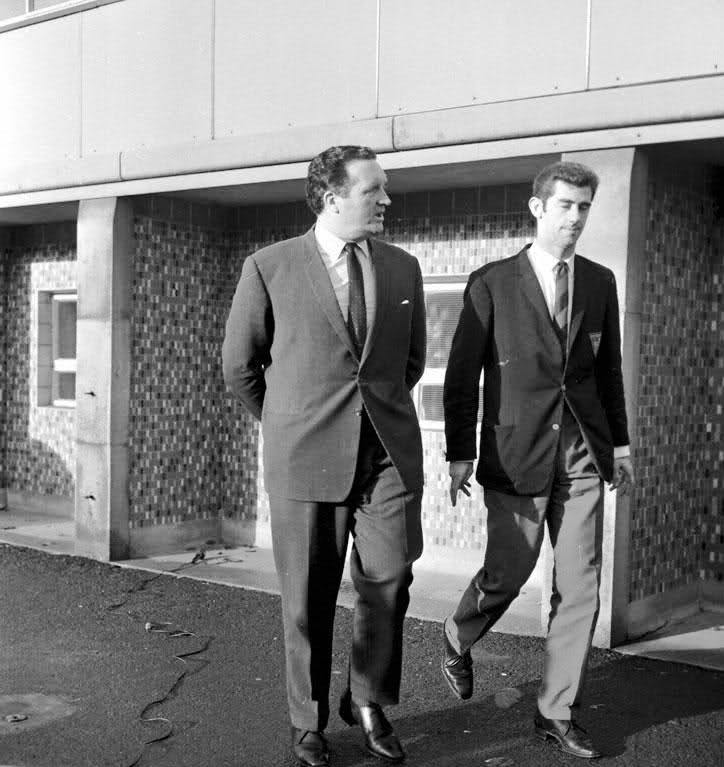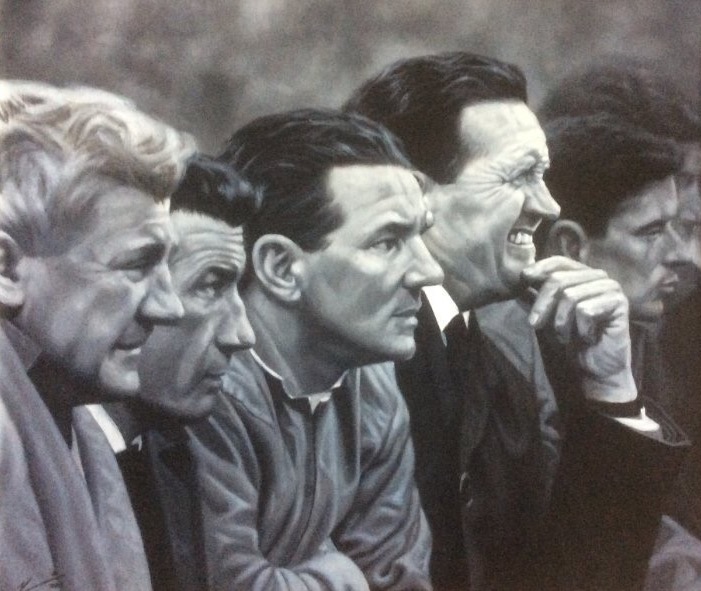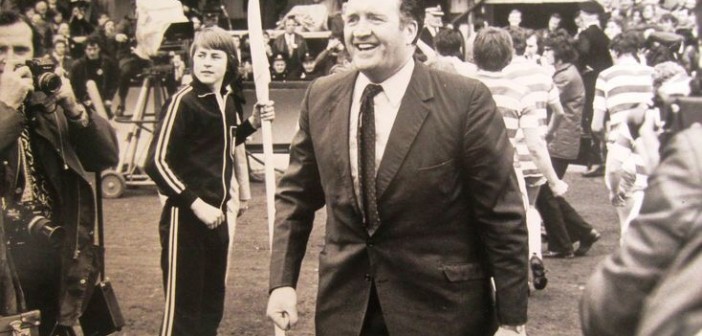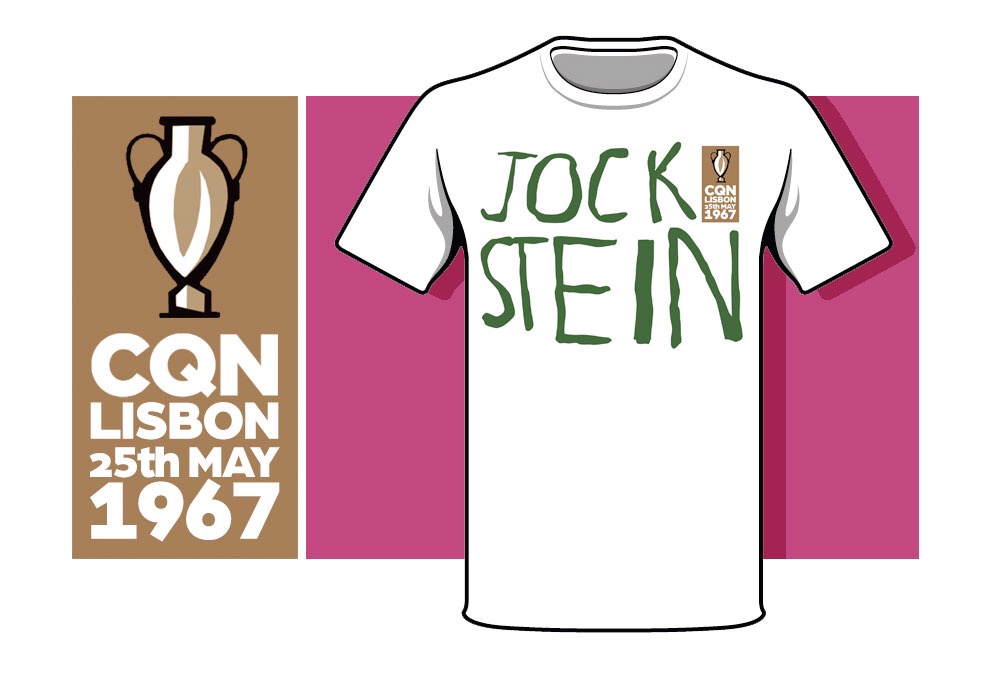THE legendary Jock Stein died on this day 32 years ago. This is an extract from the Lisbon Lions: 40th Anniversary book which paid tribute to the Big Man, which is published on CQN with permission from the author and CQNer, Alex Gordon.
JOCK STEIN had his back turned to the pitch when West German referee Kurt Tschenscher put the whistle to his lips and blew for full-time to bring to a halt the most epic encounter in Celtic’s history.
Celtic were triumphant. Celtic had conquered Europe; the first British club to do so. Stein turned slowly and brought up his fist in acclaim. “Yes!” he shouted to no-one in particular.
The Celtic bench, 30 yards away, had already joined the cavorting players on the field of the Estadio Nacional and were whooping it up with the best of them. There is a famous photograph of the Celtic bench leaping around on the touchline seconds after full-time.
There is assistant manager Sean Fallon, substitute goalkeeper John Fallon and backroom boys Neilly Mochan, Bob Rooney and Jimmy Steele catapulting to their feet in salute. There is no sign of the man who masterminded it all, though.
With time ticking down, Jock Stein had decided to go walkabout. He strolled down the touchline while the action took place only yards away. Celtic were on the brink of an historic breakthrough, minutes away from becoming only the fifth team to win the European Cup.

But Jock Stein, for once, couldn’t bear to look. Those last remaining seconds must have been agonising for the Celtic gaffer. His hard work, toil, graft and genius were all fully rewarded as soon as that whistle sounded.
Back in Glasgow the following evening, the Celtic manager was cornered live on television as his beaming players paraded the newly-won European Cup to the adoring thousands at Celtic Park who turned out to welcome back their heroes.
The commentator pushed the microphone towards Stein and said: “I am told the secret is that Celtic are one big happy family and you keep it that way.”
Stein thought for a moment and replied: “Actually, there is a better secret than that – we are a good football team.” Surely, the manager was playing down the achievements of a team that now ruled Europe.
Celtic weren’t merely a good football team – they were a magnificent football team who echoed the thoughts, methods and ambitions of their equally outstanding manager.
When Stein swept into Celtic Park in March 1965 he was paid the highest compliment by Hal Stewart, who was the flamboyant chairman of Morton. He told Big Jock: “You’re a real upstart. There we were, going about our business and getting away with it. Now you are at Celtic and we all have to buck up our ideas and start working at the game.”
Tongue-in-cheek? Possibly, but you just knew Stein was the phenomenon who drove forward not only Celtic, but also Scottish football, forward into a new era, achieving goals that were believed to be simply outrageous in earlier times. The enthusiasm of the man was staggering.
He would often be found at obscure Junior grounds on a night off watching Cambuslang Rangers, Johnstone Burgh or Baillieston. A few days later he could be taking in Manchester United v. Benfica. Football was football in its many shape and forms for Big Jock. His hunger for knowledge was insatiable.
Sir Matt Busby, the Manchester United legend who was a close friend of Stein, once recalled: “There were a few of us talking about a game we had just seen and some of us were discussing a goal that had been scored. To say we were dumbfounded when Big Jock had his say was to put it mildly.
“He took the play back about a minute or so. He told us of how some player had chosen the wrong option and had given the ball away. How it was moved around before it found its way into the opponent’s net. He had a remarkable eye for detail and a memory bank that bordered on the impossible. As history shows, he put it all to a good use.”
Billy McNeill was his onfield general and he knew the man better than most. Okay, what was his secret? McNeill would reply: “He would always tell you to play to your strengths and disguise your weaknesses.
“He insisted you helped out a colleague who may not have been having the best of days. He told you it may be your turn in the next game to need assistance. He kept it simple.
“Big Jock never asked anyone to do something he didn’t believe they had the skills to cope with. We had a real mixture of players at Celtic Park and he was the man who fused all those talents together.”
Stein’s history has been well chronicled. He started as an awkward centre-half with Blantyre Victoria before moving to Albion Rovers in 1942 and then onto Welsh club Llanelli.

He returned to Scotland and Celtic in a £1,200 deal in December 1951. Many thought he was there as mainly a back-up defender and to help with the reserves. They reckoned without the desire and ambition of this man.
Jock swiftly won a place in the first team and led the club to their Coronation Cup success in 1953 and the League and Cup double the following season. He also skippered the side to victories in the Charity Cup (1953) and the Glasgow Cup (1955).
An ankle injury forced him out of the playing side of the game in 1956 and he was appointed coach of the reserve team. Celtic overlooked what he was achieving at this level and they allowed him to move onto relegation-threatened Dunfermline.
He saved them from the drop and guided them to a Scottish Cup triumph in 1961, beating, of all clubs, Celtic 2-0 in a replay. He took over as Hibs manager in April 1964 before Celtic, in disarray, sent out the SOS in 1965. He answered that call. Things were never to be the same again at Celtic Park.
The European Cup, 10 league championships, eight Scottish Cups and six League Cups were to cascade through the frontdoor at Celtic Park as Big Jock revolutionised the game in this country.
Victory in Lisbon in 1967 was of paramount importance for Stein as he pointed out immediately afterwards: “Even some of the Italian Press have been congratulating us. They were delighted we won. It is the trend for clubs to follow successful teams, who are winning things by playing defensive football. We hope our success will make the game better throughout Europe. We would like to think people will now follow our example.”
He left his beloved Celtic in 1978. After a short spell at Leeds United, he became manager of the Scotland international side. Jock Stein died on September 10, 1985 following a 1-1 World Cup qualifying draw with Wales at Ninian Park in Cardiff. He suffered a massive heart attack and died 30 minutes after the game.
In the words of the Tartan Army’s adopted national anthem: “When will we see his likes again?”
NEW CQN PODCAST OUT NOW – LISTEN BELOW
In this week’s Centenary Special, Paul John Dykes speaks to Republic of Ireland internationalist, Chris Morris, about his Celtic career, what the club means to him, and the part he played in introducing ‘The Fields of Athenry’ to the Celtic fans’ songbook.
Enjoy the new Podcast below…



